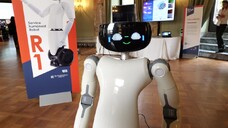Complex systems can forget the stages they have been through during evolution and rejuvenate, but they are also able to remember the path they traveled and recover the lost experience, according to an Italian Spanish study published in the journal Nature Physics and involving 2021 Nobel physicist Giorgio Parisi, Enzo Marinari and Federico Ricci Tersenghi of the Physics Department of Sapienza University of Rome and Ilaria Paga of the National Research Council’s Institute of Nanotechnology for Italy and researchers from the universities of Madrid, Extremadura and Zaragoza for Spain.
The findings promise to have an impact on many fields of research, starting from the organization of highly complex biological systems.
"Many windows are opening up thanks to this research,” Marinari told ANSA. “For example, we are able to understand the principles according to which highly complex biological systems are organized, or even to better understand glassy systems and model their capabilities," he added.
Another key player in the research is the supercomputer Janus, in whose realization Parisi and many of the Italian and Spanish authors of the new study took part.
The observations concern the spin glasses, one of the complex states of matter in which the work that earned Parisi the Nobel Prize for Physics in 2021 has been able to find an order.
Riproduzione riservata © Copyright ANSA













